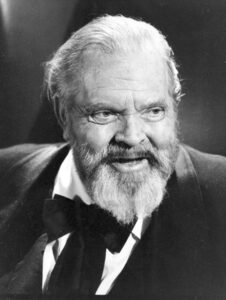 Name: George Orson Welles aka Orson Welles
Name: George Orson Welles aka Orson Welles
Essential DVDs: Citizen Kane (1941), The Magnificent Ambersons (1942), Macbeth (1948); Touch Of Evil (1958)
Oscars: Best Screenplay (Citizen Kane, 1942); Honorary Award (1971)
In His Own Words: “I started at the top and worked down.”
“The biggest electric train set any boy ever had,” pronounced Orson Welles in 1940, surveying his new domain — or, at least, that corner of it occupied by RKO, the studio that had lured the 24-year-old wunderkind to Hollywood with the promise of absolute freedom to make his directorial debut in whatever fashion he saw fit. Having conquered both theatre and radio in spectacular style, Welles’ gargantuan ego was inflated to bursting point. He quickly abandoned plans to adapt Joseph Conrad’s Heart Of Darkness and opted instead, in a fit of monumental hubris, to launch an all-out assault on one of the most powerful men in America.
That Citizen Kane is an epic tour de force, fully justifying its reputation as the greatest American film ever made, goes without saying. But beyond its cataclysmic brilliance, it encapsulates everything that is so compelling about Welles. He must have known that Kane, a sublime hatchet job on media baron William Randolph Hearst, would bring the temple walls crashing round his ears, but he had the balls to do it anyway. Welles’ superhuman talent was forever wedded to a streak of willful iconoclasm that compelled him to punch the self-destruct button just to hear the sirens wail. Even so, his stature as a filmmaker rests as much on the battlelines he drew against the forces of mediocrity as it does on his supreme artistry. He paid the full price for his audacity. In Kane’s turbulent wake, RKO butchered The Magnificent Ambersons (1942) and Journey Into Fear (1943). They took away his new toy and showed him the door.
A pariah in Hollywood, Welles declined to eat crow. Scorning the iron rule of the studios, he took hired-gun assignments only out of necessity, usually appalling his paymasters with the results. Although recognized now as the masterpieces they are, both The Lady From Shanghai (1948) and Touch Of Evil (1958) went belly up, thanks to Welles’ absolute refusal to compromise.
It’s painfully ironic that of Welles’ many unfinished films, his most cherished was an adaptation of Don Quixote. He spent his exile in Europe vaingloriously tilting at windmills, seizing every scrap of work available to fund his own projects. His ambitions invariably outpaced his means, but his indomitable spirit shows through in the Falstaffian Chimes At Midnight (1966) and the mischievous F For Fake (1975). Even at his lowest ebb, hawking cheap sherry, Birdseye peas and ‘probably the blandest lager in the world’, he still had fire in his belly. Listening to the bootleg of one of these sessions is undeniably sad, but there is something manifestly heroic in this once-towering figure, brought down by magnificent obsession, railing at the quaking tape ops like Lear bellowing into the storm. It’s as if what’s at stake is not a two-minute spot for frozen vegetables but the thing he was permitted to hold in his grasp just once: a work of art that could change the world.
